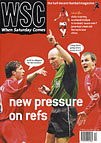 The traditional giants from Madrid and Barcelona are under increasing pressure from the commonsense approach of Galicia's Deportivo and Celta, says Sid Lowe
The traditional giants from Madrid and Barcelona are under increasing pressure from the commonsense approach of Galicia's Deportivo and Celta, says Sid Lowe
When Real Madrid beat Manchester United 3-2 at Old Trafford in March 2000, Spain’s best-selling newspaper, the sports daily Marca, threw its arms in the air and declared the players Eleven Di Stéfanos. There were no such plaudits when Deportivo La Coruña repeated the feat this year. Marca’s front page led on Steve McManaman’s goal against Anderlecht two nights previously, while the country’s second best seller, AS, broke the shock “news” that it would be virtually impossible to get tickets for the Madrid v Barelona derby. The Barcelona papers El Mundo Deportivo and Sport are every bit as myopic.
Despite being ignored in this manner, a serious challenge to the old order has been launched in Spain’s wet, northwestern corner, Galicia. Marca may not like it, but Deportivo La Coruña are top at the time of writing, with their unbeaten gallego neighbours Celta de Vigo just behind. Meanwhile, Real Madrid stumble from one poor performance to the next.
Galician success should come as no surprise. Last year Depor were second and Celta sixth, while both reached European quarter-finals. In 2001, they’re statistically Spain’s best sides. Moreover, Depor won the league in 2000 and Celta, so long the fantasy footballers, have added the defensive solidity necessary to mount a sustained challenge.
Both sides play coherent, fluid and balanced (not to mention entertaining) football – a stark contrast to the disjointed individualism on display at the Bernabéu and the Camp Nou. Spain’s footballing behemoths could learn a thing or two from their gallego rivals.
The fundamental lesson, studiously ignored by the Big Two, is: get the right manager, stick by him and let him run the bloody side. Celta and Depor have excellent coaches. Javier Irureta led Santander and Oviedo to their best positions for 40 years before moving to Depor (via Celta), while Victor Fernández won the Copa del Rey in 1994 and the Cup-Winners Cup in 1995 with Zaragoza. Irureta won Depor’s only title; Fernández’s fifth place in 1999 was Celta’s highest finish in 53 years.
But it’s in the transfer market where Galicia really provides a model. Celta and Depor’s policies are revolutionary: they let their coaches decide who to buy. The result? Both sign players they actually need. This summer, Deportivo’s major signing was Sergio González, who slotted straight into the side. Ditto Peter Luccin at Celta. Contrast this with Real Madrid’s decision to buy Zinedine Zidane, a man the coach Vicente del Bosque didn’t want. Madrid needed a centre-back and a striker, not another creative midfielder. Zidane’s arrival proved the catalyst for the tactical uncertainty that has accompanied Madrid’s worst start since 1947. Likewise, Barça’s big signing – the work of president Joan Gaspart – was Argentinian striker Javier Saviola, an unneeded superstar who’s spent most of his time on the bench.
Deportivo’s Diego Tristán sums up so much of what’s wrong at Madrid. Their last president, Lorenzo Sanz, all but signed him from Mallorca, only to lose the election to Florentino Pérez in summer 2000. The deal promptly collapsed. Not because Real no longer needed Tristán – far from it – but because Pérez wanted Luis Figo and wouldn’t buy one of “Sanz’s players”.
Deportivo have bought players like Víctor (foolishly released by Madrid), Donato and Manuel Pablo at knockdown prices. Celta have bought well, too, but have sold even better. Claude Makelele came for £1.2 million and left for £10 million, youth team product Míchel Salgado went for £8 million (both to Madrid) and they even managed to make £4.5 million on the aptly named Mario Turdó (to Rennes). Meanwhile, Barça and Madrid’s assets rot on the bench or, like Pep Guardiola and, almost certainly, Aitor Karanka, see out their contract and leave on a free.
Whether Celta and Deportivo can maintain their current position remains to be seen, of course. But maybe, just maybe, Pérez and Gaspart might learn that building a team is best left to the coach. And if Celta or Depor do win the league, you can see the headlines now – Madrid Buy Shevchenko.
From WSC 178 December 2001. What was happening this month